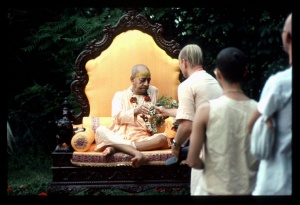CC Madhya 19.204 (1975): Difference between revisions
(Vanibot #0027: CCMirror - Mirror CC's 1996 edition to form a basis for 1975) |
(Vanibot #0020: VersionCompareLinker - added a link to the Version Compare feature) |
||
| Line 2: | Line 2: | ||
<div style="float:left">'''[[Sri Caitanya-caritamrta (1975)|Śrī Caitanya-caritāmṛta (1975)]] - [[CC Madhya (1975)|Madhya-līlā]] - [[CC Madhya 19 (1975)|Chapter 19: Lord Śrī Caitanya Mahāprabhu Instructs Śrīla Rūpa Gosvāmī]]'''</div> | <div style="float:left">'''[[Sri Caitanya-caritamrta (1975)|Śrī Caitanya-caritāmṛta (1975)]] - [[CC Madhya (1975)|Madhya-līlā]] - [[CC Madhya 19 (1975)|Chapter 19: Lord Śrī Caitanya Mahāprabhu Instructs Śrīla Rūpa Gosvāmī]]'''</div> | ||
<div style="float:right">[[File:Go-previous.png|link=CC Madhya 19.203 (1975)|Madhya-līlā 19.203]] '''[[CC Madhya 19.203 (1975)|Madhya-līlā 19.203]] - [[CC Madhya 19.205 (1975)|Madhya-līlā 19.205]]''' [[File:Go-next.png|link=CC Madhya 19.205 (1975)|Madhya-līlā 19.205]]</div> | <div style="float:right">[[File:Go-previous.png|link=CC Madhya 19.203 (1975)|Madhya-līlā 19.203]] '''[[CC Madhya 19.203 (1975)|Madhya-līlā 19.203]] - [[CC Madhya 19.205 (1975)|Madhya-līlā 19.205]]''' [[File:Go-next.png|link=CC Madhya 19.205 (1975)|Madhya-līlā 19.205]]</div> | ||
{{CompareVersions|CC|Madhya 19.204|CC 1975|CC 1996}} | |||
{{RandomImage}} | {{RandomImage}} | ||
==== TEXT 204 ==== | ==== TEXT 204 ==== | ||
| Line 13: | Line 12: | ||
:sāṅkhya-yogaiś ca sātvataiḥ | :sāṅkhya-yogaiś ca sātvataiḥ | ||
:upagīyamāna-māhātmyaṁ | :upagīyamāna-māhātmyaṁ | ||
:hariṁ | :hariṁ sā 'manyatātmajam | ||
</div> | </div> | ||
| Line 20: | Line 19: | ||
<div class="synonyms"> | <div class="synonyms"> | ||
trayyā—by followers of three Vedas who perform great sacrifices | trayyā—by followers of three Vedas who perform great sacrifices (like the demigod Indra); ca—also; upaniṣadbhiḥ—by the followers of the Upaniṣads, the most exalted portion of Vedic knowledge (as Brahman); ca—also; sāṅkhya—by the philosophers who analytically study the universe (as the puruṣa); yogaiḥ—by mystic yogīs (as the Paramātmā situated everywhere); ca—and; sātvataiḥ—by devotees who follow the method of worship mentioned in the Pañcarātra and other Vedic literature (as Bhagavān); upagīyamāna—being sung; māhātmyam—whose glories; harim—unto the Supreme Personality of Godhead; sā—she (mother Yaśodā); amanyata—considered; ātma-jam—as her own son, born of her body. | ||
</div> | </div> | ||
| Line 27: | Line 26: | ||
<div class="translation"> | <div class="translation"> | ||
" 'When mother Yaśodā saw all the universes within Kṛṣṇa's mouth, she was astonished for the time being. The Lord is worshiped like Indra and other demigods by the followers of the three Vedas, who offer Him sacrifices. He is worshiped as impersonal Brahman by saintly persons who understand His greatness through studying the Upaniṣads, as the puruṣa by great philosophers who analytically study the universe, as the all-pervading Supersoul by great yogīs, and as the Supreme Personality of Godhead by devotees. Nevertheless, mother Yaśodā considered the Lord her own son.' | |||
</div> | </div> | ||
| Line 34: | Line 33: | ||
<div class="purport"> | <div class="purport"> | ||
This verse is quoted from Śrīmad-Bhāgavatam ([[SB 10.8.45]]). Those who are spiritually advanced forget | This verse is quoted from Śrīmad-Bhāgavatam ([[SB 10.8.45|10.8.45]]). Those who are spiritually advanced forget Kṛṣṇa's opulence by the mercy of yogamāyā. For instance, mother Yaśodā considered Kṛṣṇa an ordinary child. | ||
</div> | </div> | ||
Latest revision as of 11:56, 27 January 2020

A.C. Bhaktivedanta Swami Prabhupada
TEXT 204
- trayyā copaniṣadbhiś ca
- sāṅkhya-yogaiś ca sātvataiḥ
- upagīyamāna-māhātmyaṁ
- hariṁ sā 'manyatātmajam
SYNONYMS
trayyā—by followers of three Vedas who perform great sacrifices (like the demigod Indra); ca—also; upaniṣadbhiḥ—by the followers of the Upaniṣads, the most exalted portion of Vedic knowledge (as Brahman); ca—also; sāṅkhya—by the philosophers who analytically study the universe (as the puruṣa); yogaiḥ—by mystic yogīs (as the Paramātmā situated everywhere); ca—and; sātvataiḥ—by devotees who follow the method of worship mentioned in the Pañcarātra and other Vedic literature (as Bhagavān); upagīyamāna—being sung; māhātmyam—whose glories; harim—unto the Supreme Personality of Godhead; sā—she (mother Yaśodā); amanyata—considered; ātma-jam—as her own son, born of her body.
TRANSLATION
" 'When mother Yaśodā saw all the universes within Kṛṣṇa's mouth, she was astonished for the time being. The Lord is worshiped like Indra and other demigods by the followers of the three Vedas, who offer Him sacrifices. He is worshiped as impersonal Brahman by saintly persons who understand His greatness through studying the Upaniṣads, as the puruṣa by great philosophers who analytically study the universe, as the all-pervading Supersoul by great yogīs, and as the Supreme Personality of Godhead by devotees. Nevertheless, mother Yaśodā considered the Lord her own son.'
PURPORT
This verse is quoted from Śrīmad-Bhāgavatam (10.8.45). Those who are spiritually advanced forget Kṛṣṇa's opulence by the mercy of yogamāyā. For instance, mother Yaśodā considered Kṛṣṇa an ordinary child.